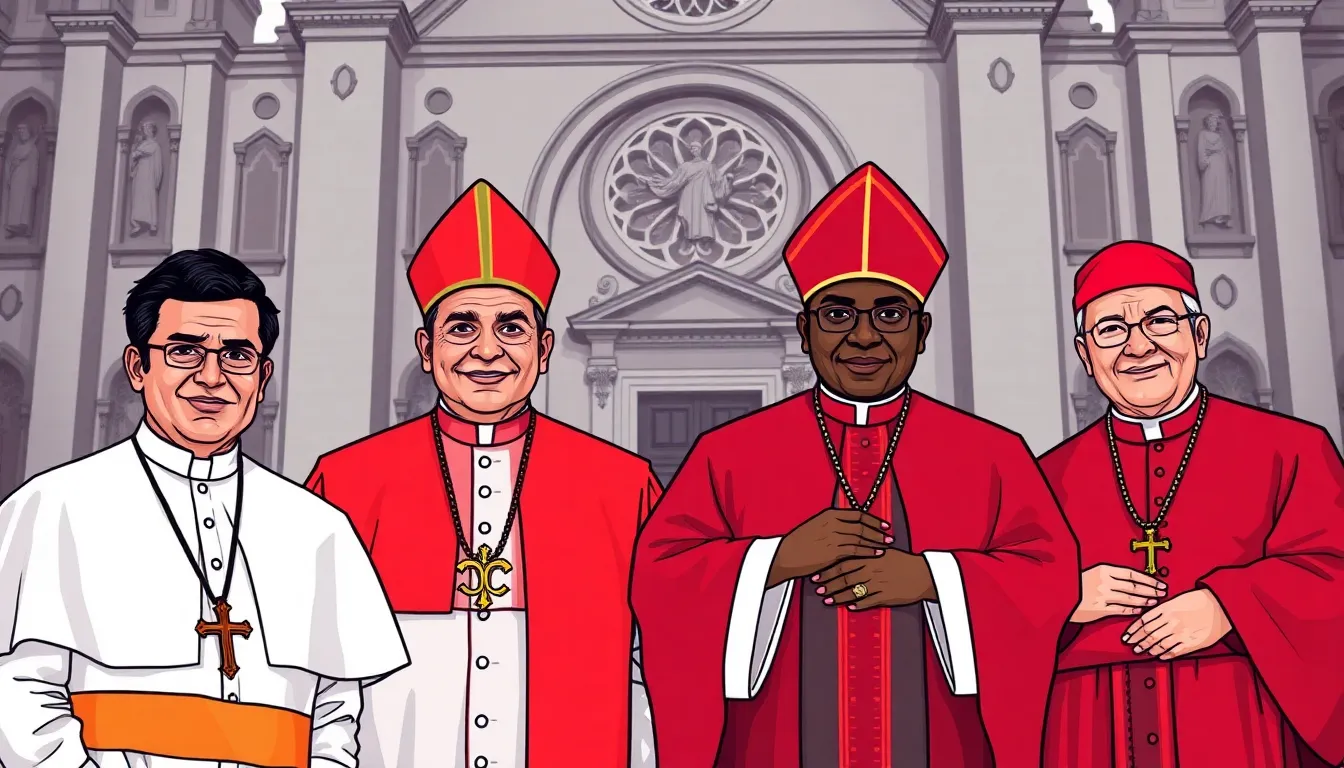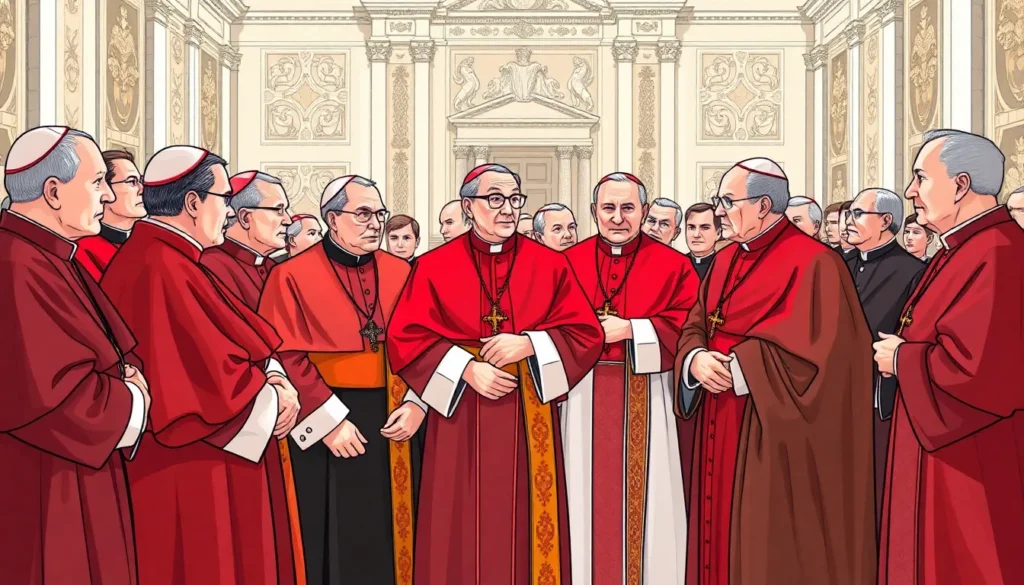As the Vatican gears up for another papal selection, the excitement is palpable. Who will don the white cassock and take the helm of the Catholic Church? It’s not just a religious position; it’s a global spectacle filled with intrigue, politics, and maybe even a sprinkle of divine intervention.
From seasoned cardinals to rising stars, the candidates are as varied as the flavors of gelato in Rome. Each contender brings their own unique flair, and the stakes couldn’t be higher. Will it be a traditionalist who clings to age-old practices or a progressive voice ready to shake things up? Buckle up, because this isn’t just a race for a title; it’s a journey that could redefine the future of millions. Let’s dive into the contenders and see who’s really in the running for the papacy.
Table of Contents
ToggleOverview of Papal Conclave
The papal conclave is a crucial event for the Catholic Church, marking the selection of a new pope. This process occurs after the death or resignation of a pope, gathering cardinals from around the world to elect his successor. During this event, cardinals enter a closed session at the Vatican, isolated until they reach a decision. Secrecy and solemnity characterize this gathering, emphasizing the significance of the task at hand.
Voting takes place in multiple rounds, and a two-thirds majority is required for a candidate to emerge as pope. Each cardinal casts a ballot, and when a cardinal receives enough votes, white smoke signals their selection to the public. Conversely, if a candidate is not chosen, black smoke denotes the continued search for a leader. This ritual has become iconic, drawing attention from both the media and the faithful.
Candidates often display a range of theological perspectives. Traditionalists may focus on maintaining established church doctrines, while progressives might advocate for changes in certain practices. Each contender, regardless of inclination, brings unique experiences and insights that could shape the church’s future direction. The recent rise of social issues and global challenges necessitates thoughtful consideration of these candidates’ platforms.
Cardinals generally discuss candidates’ qualifications and potential impact before voting. Connections formed among cardinals can influence decisions, as alliances often emerge based on shared beliefs and experiences. This dynamic aspect of the conclave showcases both the personal and institutional stakes involved in selecting a new pope. The outcomes can reverberate well beyond the walls of the Vatican, affecting millions of followers worldwide.
Key Contenders for Pope

A diverse group of candidates emerges as potential successors in the papal selection. Each contender brings unique perspectives and theological views that could shape the future of the Catholic Church.
Cardinal Rodrigo Maradiaga
Cardinal Rodrigo Maradiaga from Honduras stands as a prominent figure among the contenders. Known for his progressive stances, he emphasizes the need for significant reform within the Vatican. His experience as the head of the Council of Cardinals showcases his leadership skills and commitment to addressing modern challenges facing the Church. Maradiaga’s supporters regard him as a candidate who can bridge gaps between traditional beliefs and contemporary issues.
Cardinal Peter Turkson
Originating from Ghana, Cardinal Peter Turkson is widely recognized for his advocacy on social justice and environmental issues. Previously serving as the Prefect of the Dicastery for Promoting Integral Human Development, he emphasizes the role of the Church in global humanitarian efforts. Turkson’s focus on sustainable development resonates with many in an era dominated by ecological concerns. His candidacy highlights a vision for a compassionate and inclusive Church.
Cardinal Luis Antonio Tagle
Cardinal Luis Antonio Tagle from the Philippines is another strong contender. Known for his charismatic communication style, he connects well with younger generations. Tagle’s emphasis on pastoral care and his commitment to social issues garner widespread respect. Many view him as a voice of hope, advocating for a Church that meets the needs of the marginalized in society. His international experience may bring a fresh perspective to the papacy.
Cardinal Robert Sarah
Cardinal Robert Sarah of Guinea stands out for his adherence to traditional Catholic doctrines. He advocates for a return to core Church values, emphasizing stability and continuity. Many see Sarah’s strong theological background as essential during a time of change. His perspectives challenge progressive views, creating a balance among candidates. Supporters appreciate his commitment to preserving the Church’s foundational teachings in an evolving world.
Factors Influencing the Selection
Several factors shape the selection of the new pope. Both internal dynamics and global trends play significant roles in this pivotal moment for the Catholic Church.
Political Dynamics within the Vatican
Complex political dynamics exist within the Vatican. Cardinals engage in strategic discussions about their preferences and qualifications. Alliances form based on shared beliefs, impacting candidate support. Additionally, the influence of various factions among cardinals can dramatically alter voting results. Power struggles often highlight different theological perspectives, with traditionalists advocating for established dogmas while progressives push for reform and adaptation. Such interactions create a unique atmosphere, infusing the conclave with intense deliberation and dialogue.
Global Catholic Church Trends
Trends within the global Catholic Church significantly influence candidate selection. Increased attention on social justice issues has shifted priorities for many followers. Candidates aiming to resonate with the laity often address topics like poverty, climate change, and equality. Younger generations seek leaders who demonstrate an understanding of contemporary challenges. Growing secularism in certain regions also impacts the Church’s approach to maintaining relevance in a modern context. Ultimately, a candidate’s ability to navigate these global trends will affect their potential to lead effectively.
Predictions for the Next Pope
Key contenders for the papacy show a mix of traditionalism and progressive ideas. Cardinal Rodrigo Maradiaga from Honduras stands out for advocating significant reform within the Church, promoting change in its approach to contemporary issues. Born in 1942, he emphasizes the need for adaptations that can engage younger generations.
Next, Cardinal Peter Turkson from Ghana focuses on social justice and environmental matters. His experience at the Vatican and commitment to these issues reflect a compassionate vision for the Church that resonates globally. Born in 1948, he advocates for a faith community actively involved in addressing these challenges.
Cardinal Luis Antonio Tagle from the Philippines connects particularly well with youth. Prioritizing pastoral care, he emphasizes compassion and inclusion, vital for the Church’s future. His background in diverse social environments positions him as a bridge to a broader audience.
In contrast, Cardinal Robert Sarah of Guinea represents a traditionalist perspective. Advocating for continuity and stability in Church doctrine, he emphasizes the importance of established practices and teachings. His views appeal to those who value tradition amid changing times.
Factors influencing the papal selection process involve intricate political dynamics within the Vatican. Cardinals form alliances based on shared beliefs, affecting the level of support for each candidate. Past discussions indicate that candidates aligning with prevailing societal issues tend to attract more votes.
The upcoming papal selection promises to be a pivotal moment for the Catholic Church and its followers. With a diverse range of candidates each representing distinct theological viewpoints the implications of this decision extend far beyond the Vatican. As the cardinals deliberate in the conclave their choices will reflect not only the Church’s traditions but also its response to modern challenges.
The dynamics at play will shape the Church’s future direction and its ability to engage with a rapidly changing world. The global community watches closely as the next pope emerges ready to lead millions through both faith and societal issues.

